- Home
- Tim LaHaye
Mark of Evil Page 14
Mark of Evil Read online
Page 14
Off to the side, the shorter man in the camel-hair robe said to the other man standing with him, “He quotes from Jeremiah.”
“Yes,” the taller man responded. “But maybe he should have quoted what comes after: ‘Behold the days are coming, declares the LORD, when I will raise up for David a righteous Branch; and He will reign as king and act wisely and do justice and righteousness in the land.’ ”
Now the group of young men were poking and pushing the three priests as they tried to walk away, continuing to shout at them. “We worship the weed! And we worship the whore. And every pleasure we can find. It’s better than your ridiculous God.”
The bigger man in the group grabbed the older priest by his sash and yanked on it until the old man tripped and fell. Several of his gang began to kick the priest while he was on the ground.
That was when a squad of Global Alliance police who had been at the far end of the plaza trotted over to the scene. When the young men saw them, they sprinted in the opposite direction. The police ordered the crowd to disperse. The two priests helped the old man up to his feet and brushed off his garments. One of them asked the police, “Aren’t you going to pursue those ruffians?”
But the cop shook his head. “We’re here to keep the peace. We’ve told you people several times to create a different entrance for yourselves so you can get up to the temple without disturbing the civilians. They have rights too.”
All the while, the two men in the rough-hewn robes watched with countenances like stone. The shorter one finally spoke. “The fathers have abandoned their sons. The young men have rejected the fathers. And this is what results.”
The taller man nodded. “Which brings us to this hour. The fullness of time.”
In Agion House, the prime minister’s white stone mansion just off of Balfour Street in the stylish Rehavia District of Jerusalem, Sol Bensky had just finished dinner with his wife, Esther. As the servants cleared the table, both of them waved off the idea of dessert, but Esther asked for chamomile tea and Sol for some plain black coffee.
“You’ll be up all night if it’s not decaf,” Esther said gently.
“I’ll be up all night regardless,” he replied. “The presence of the Global Alliance controlling us here in Jerusalem has become a nightmare. The Knesset has a number of proposals to counter this drastic stranglehold of the Alliance. I need to review them tonight.”
“Who is leading the anti-Alliance movement?”
“Joel Harmon.”
“The fighter pilot? The hero from the War of Thunder against the Russian-Arab coalition?”
Sol rolled his eyes. “Everyone says that. Yes, he’s a hero. Was a hero. But to me he is simply a thorn in my flesh.”
“Really, Sol? You think so?”
“A few years ago he had the audacity to bring the American, that Colonel Joshua Jordan, into my office for a meeting. Colonel Jordan ended up insulting me to my face.”
“I think I remember that, dear.”
“How could you possibly—”
“Didn’t he quote from 1 Kings 11:1 in that meeting?”
Sol’s face fell, but he waited to reply because the kitchen aide was bringing in his coffee and his wife’s tea. When she left, Sol responded in a blistering voice, “Yes, the part about Solomon having many foreign women! Can you imagine the outrage?”
“I believe, dear, that Colonel Jordan was using that as a metaphor.”
“I don’t care what he was using it for.” But a few moments later he asked, “A metaphor for what?”
“Spiritual adultery of Israel. The kind that comes with dalliances with foreign intruders and idolatry and false religions.”
Sol grimaced and tossed his napkin on the table. “And you agree with the American, I suppose?”
Esther paused for a long time and took a slow sip from her teacup. She wiped her mouth demurely with her napkin and then answered him. “I heard there was another incident down by the temple today. Three priests were accosted by a group of young toughs who sound like they had been high on pot or liquor or both. I imagine those young men were probably in town to savor the delights of our fine array of sex-trade shops and drug cafés.”
“Enough!” he shouted as he rose to his feet and began to head toward his study. “I am not responsible for the decadence and the depravity that has infiltrated Jerusalem.”
“Perhaps you’re right, my love,” his wife said in her soft voice. “But if not, who is?”
TWENTY-FOUR
NEW BABYLON, IRAQ
If it had been under a big top, it would have been the world’s biggest three-ring circus. Three separate gatherings were simultaneously taking place in different parts of the one-hundred-square-mile complex of buildings within Iraq that belonged to the Global Alliance. And each of the conclaves had their own ringmaster.
In the case of the geopolitical meeting, Alexander Colliquin held the position of master of ceremonies, seated in his elevated faux throne, overseeing the proceedings while the caucuses took place in different corners of the Alliance’s World Parliament. He was monitoring their progress through the use of the touch screen of his wireless control panel that was set into the extra-wide arm of his chair.
There was even a kind of high-wire act taking place, performed by former U.S. president and now temporary regent Jessica Tulrude, who scurried around the hall counting votes, twisting arms, and making deals as the personal envoy of Alexander Colliquin. The global chancellor desperately needed a yes vote on the single motion on the slate for today, and he had tasked Tulrude, his political insider, to get it done.
The motion up for consideration had required the convening of a full assembly of nations. Delegates filled the mammoth curved chambers decorated with three-story-high double Romanesque pillars in each of the four corners. As soon as the caucuses ended, the ten regents from each of the ten global regions would be seated in the inner lighted ring in the well of the chamber; they would be surrounded by the larger concentric circle of the arena, populated by two representatives from each of the nations that constituted their respective region.
The motion to be debated and then voted upon was the draconian set of trade sanctions Colliquin wanted imposed on the United States. The logic behind those drastic measures was simple: it was an attempt to finally bring America to its knees, forcing the current Hewbright administration—or his successor, if he was removed from office by the Senate—to join the rest of the Alliance.
The delegates had been invited to come to New Babylon a day or two early, if they wished, so they could enjoy the theaters or the fashionable sex-trade shops in the entertainment district. Colliquin figured that might soften up some of them. But now it was down to business, and Colliquin had made it quite clear to Jessica Tulrude that she had to do whatever it took to ensure the vote.
It had taken awhile for Tulrude to work on Canada to convince their delegation to vote yes, but in the end it was accomplished. Mexico was already in the bag. Now she was button-holing the senior member of the British contingent, but he was resistant.
“Jessica, you and I have both read the Economic Commission’s study,” the Brit said. “It’s giving a doomsday scenario for the United States if we vote for these kinds of sanctions. Really, the scope of this proposal is breathtaking—banning all trade with America, shutting off imports to its shores, including consumer products and petrol. Their strategic oil reserves could be depleted in a matter of months. The report estimates a collapse of the New York Stock Exchange and the commodities markets in sixty days, probably less. And all this while the president is facing impeachment. Good heavens, it seems clear that internal civil war could break out inside America’s shores within months if you push your plan. It’s rather ironic, but true, that heartless tyrants like Saddam Hussein are always capable of maintaining control for long periods of time in the face of crippling sanctions. On the other hand, legitimate democracies simply cannot.”
“I see that you’re just singing the tune that Prim
e Minister Harrington has scripted for you,” Tulrude shot back. “Why don’t you tell your man over at 10 Downing Street that he’s making some very powerful enemies.”
“I’m afraid we’re rather firm on this.”
Tulrude snapped back, “You just don’t get it. Jolly old England is a tiny little island, and in the grand scheme of things you have a small economy and very little prestige left. Nobody cares anymore about your royalty or your past history of empire or your beefeaters in their cute red outfits standing outside Buckingham Palace.”
The British delegate smiled and struggled not to smirk. “Actually, Jessica, the beefeaters in the quaint red uniforms are the yeomen of the guard—strictly ceremonial. You’ve confused them with the—”
“Forget the lecture,” she bulleted back. “We want your yes vote today or there will be repercussions.”
“The thing about us Brits,” he replied in a stronger tone now, “is that we don’t take kindly to threats, or to hobnail boots on the back of our necks, for that matter. We didn’t take it from Hitler. And we won’t take it from you.”
There were very few occasions when Jessica Tulrude was at a loss for words. But this was one of them. She stammered for a few seconds, then threw the British delegate a dagger-eyed look that said, You’re a dead man. You just don’t know it yet, and stomped off.
At that same moment, twenty miles away in the great ballroom of the World Economic Convention headquarters in New Babylon, Colliquin’s deputy, Ho Zhu, sat at the head table, feting a banquet for the CEOs of the two thousand largest companies on the globe. Beneath crystal chandeliers they had dined on black truffles, beluga caviar, rare la Bonnette potatoes, and Kobe beef flown in from Hyogo, Japan, while they enjoyed the sounds of a string quartet. The event had singlehandedly cleared out the world’s supply of bottled 1959 Chateau Mouton Rothschild.
After dessert was served—imperial caramel gingerbread pyramid—the dignified mood changed. A spotlight at the end of the hall lit up a golden curtain, which opened to the sight of twenty-six-year-old global pop music sensation Gigi Salome, who had poured herself into a sexually suggestive leopard-skin bodysuit for the occasion. Her rock band was behind her, and together they charged into the thumping beat of her number one international hit. The business leaders applauded wildly at the surprise performance.
The usually stern-faced Ho nodded and half smiled. While the music blasted, he turned to his assistant sitting to his right. “Security has verified that all of our guests have tickets? And they have checked identification?”
His assistant nodded. “Yes, sir.” Then, as he glanced at the bottles of the world’s most expensive champagne flowing into crystal glasses, he added, “And we are sure that none of the media have slipped in.”
After Gigi Salome finished her music set, one of five CEOs who had been carefully selected by Ho Zhu’s staff to offer a toast rose to his feet and used his knife to tap his water glass next to the little wireless microphone pad on the table in front of him. The crowd of two thousand began to quiet down.
“I propose a toast,” he announced. “To Ho Zhu, the finance minister of the Global Alliance, for his leadership in forging our worldwide enterprise coalition. Since the Global Alliance was formed, we have seen a global increase in GDP by almost three percent and unemployment worldwide has decreased by two-and-a-half percent. A modest beginning, perhaps, but hopeful. And I believe the trend will continue and the effects of this temporary financial slowdown will eventually be eradicated.”
Cheers broke out across the great hall.
“And, as another reason for a toast to our gracious host, I further expect we will soon learn the World Parliament, which is convening at this very moment, will vote to impose economic sanctions on the United States to bring that nation to its senses so it will finally join our Global Alliance.”
There was another round of cheers.
“And lastly, we toast Mr. Ho because we anticipate that the Alliance will soon be able to take control of the massive shale oil deposits that have been discovered in Israel and place them on the international market for global bidding so that the world may benefit from those oil-rich deposits.”
The audience reacted with jubilance.
Then he added, “After all, why should the Israelis be allowed to monopolize their shale oil deposits? Israel has had the benefit of an energy windfall ever since their victory over the Russian-Arab coalition. For at least a period of—what has it been, six years or so now—they’ve been burning those lignostone weapons that the Russians used and then abandoned, along with the unspent nuclear fuel from the Iranian missile that dropped on them but didn’t detonate. So the Israelis have been storing those deposits of energy. They don’t need the oil as badly as the rest of the world does.”
With that, the CEO lifted his glass. “To Mr. Ho Zhu!” he shouted, and following his lead the entire hall of billionaires rose to their feet and raised their glasses to Ho Zhu and to the Global Alliance. “To Ho Zhu! To the Global Alliance!”
Around the same time, in the very center of New Babylon, Bishop Dibold Kora was conducting an evening meeting of the One Movement Spiritual Council. Seventy other leaders from the world’s religions had gathered with him: a few high lamas from the Gelug sect of the Tibetan Buddhists; two shamans from Gabon and the Philippines, respectively; a half-dozen Hindu priests; eighteen Islamic clerics; a scattering of representatives from various occult, New Age, Gnostic, and spiritualist groups; two Oglala medicine men from the Native American tribes and several others from indigenous tribal groups from around the world; and a full contingent of church denominational delegates as well. They were seated around a semicircular conference table with Kora at the head.
Kora announced the single order of business. “The question that brings us together is whether this body should formally petition the Global Alliance Parliament. The request would be for increased enforcement of the public safety regulation they have already passed, which lists the Rapture Jesus followers—including members of the socalled Remnant—as a menace to public safety and welfare. We have all recognized, of course, that their mass suicide cult poses a danger to the physical, mental, and spiritual health of the public. Yet, tragically, it seems that despite existing regulations, their group is growing like an unchecked virus and gaining new converts by the hour. This is a very unsettling signal. We have extended free counseling sessions to these delusional Jesus extremists so they can come to grips with their antisocial, fundamentalist urges, but to no avail. And so we have convened this special session to urge Parliament to take even stronger action to pursue them and squelch their unhealthy influence.”
Bishop Kora then turned to Higga Monodostra, who sat to his right, dressed in the black robes of a Wiccan priestess, to offer a hymn of exultation to bless their deliberations. While Monodostra extolled Mother Earth and the harmony of the universe with her arms raised and a beatific expression on her face, Kora glanced down at the screen of his Allfone wrist device. He had just received an insta-memo from Alexander Colliquin.
Full vote in World Parliament taken. Victory. Sanctions against U.S.A. to commence ASAP.
It was excellent news, and Kora smiled at the breakthrough and what it meant for his own ambitions and for the Global Alliance.
TWENTY-FIVE
JERUSALEM, ISRAEL
The voice at the other end of the Global Alliance military satphone was terse. “Should we proceed to an attack point or not? We’re awaiting orders. My men are ready. We’re about a half kilometer away from the stadium.”
The plainclothes Global Alliance detective held his satphone to his ear, peering through one of the entrance gates into Teddy Kollek Stadium to get a better view inside. Another Alliance detective stood next to him with the same view, and he was shaking his head dismally.
The detective snapped back, “How many troops did you say you have?”
“Two hundred and twenty,” was the reply at the other end. “How many of these Remnant sympathi
zers are there in the stadium?”
It was evening and someone had clicked on the stadium lights. But this was no soccer match. In the center of the playing field Rabbi ZG stood on a hastily constructed platform and addressed the crowd on a wireless microphone. The stadium was nearly full as the detective sized up the scene.
“Well,” the detective replied dejectedly, “a surprising number of them showed up.”
His partner bent over and yelled into the satphone, “It holds about fifty thousand. I’m betting at least forty thousand are here. Maybe more. An assault would be craz—”
But the senior detective threw his partner a dirty look and pulled the phone away. Lowering his voice, he spoke. “This stadium is full. You need more men.”
“I’m not sure we can hustle up a larger assault team on short notice. I was told this unauthorized assembly would only be a thousand or two, tops.”
“That was the projection. Nothing on the web. No posters. Our intel said it was strictly word of mouth. It looks like someone guessed wrong.” After a pause the detective added, “I’m going to put a call in to the base commander. Talk to him myself.”
In the stadium, Rabbi ZG had been speaking about the horrors of Babylon, a biblical prophecy he said had now been fulfilled. And about Alexander Colliquin’s corrupt rule over Jerusalem and most of the world through the Global Alliance.
“But there is good news tonight!” he shouted. “All who call on the name of the Lord Jesus Christ can be saved. In other words, all who will confess their state of sin and claim the benefits of forgiveness by the blood of Jesus the Christ, who shed it for us on the cruel cross, and all who believe in Him as the One who was raised from the dead according to Scripture, the only true Messiah, the Son of God, the son of David, and the son of Abraham. Scripture tells us that in the latter days God will call out from among you sons and daughters of Israel—from the twelve tribes. One hundred and forty-four thousand valiant ones who, like the apostle Paul of old, will turn the world upside down for Jesus the Messiah. Will you become one of those valiant ones tonight?”

 Glorious Appearing: The End of Days
Glorious Appearing: The End of Days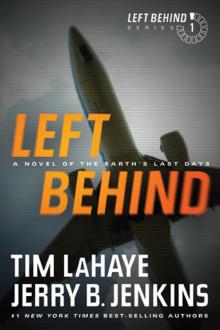 Left Behind: A Novel of the Earth's Last Days
Left Behind: A Novel of the Earth's Last Days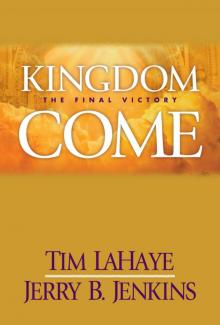 Kingdom Come: The Final Victory
Kingdom Come: The Final Victory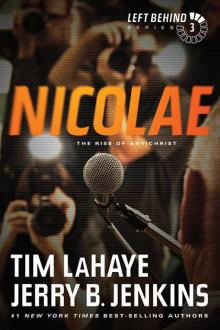 Nicolae: The Rise of Antichrist
Nicolae: The Rise of Antichrist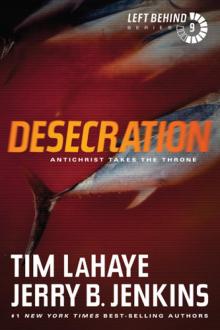 Desecration: Antichrist Takes the Throne
Desecration: Antichrist Takes the Throne Mark's Story: The Gospel According to Peter
Mark's Story: The Gospel According to Peter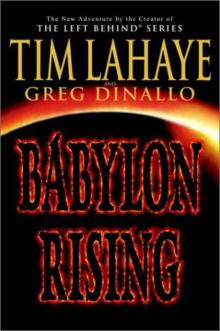 Babylon Rising
Babylon Rising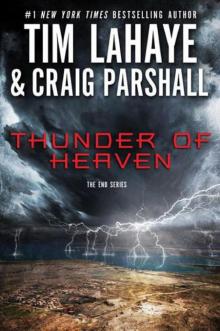 Thunder of Heaven: A Joshua Jordan Novel
Thunder of Heaven: A Joshua Jordan Novel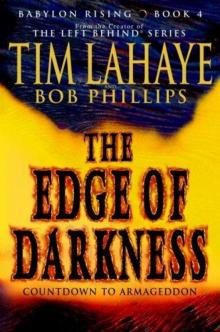 The Edge of Darkness
The Edge of Darkness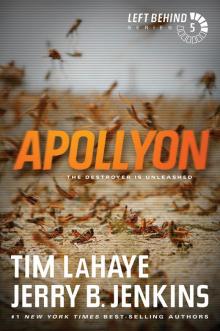 Apollyon: The Destroyer Is Unleashed
Apollyon: The Destroyer Is Unleashed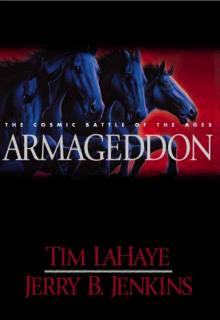 Armageddon: The Cosmic Battle of the Ages
Armageddon: The Cosmic Battle of the Ages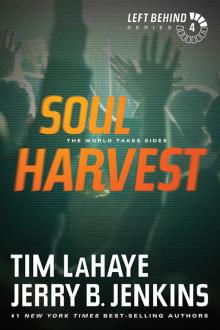 Soul Harvest: The World Takes Sides
Soul Harvest: The World Takes Sides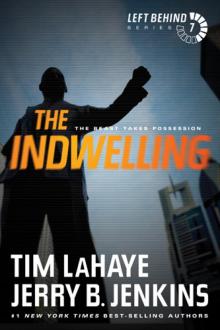 The Indwelling: The Beast Takes Possession
The Indwelling: The Beast Takes Possession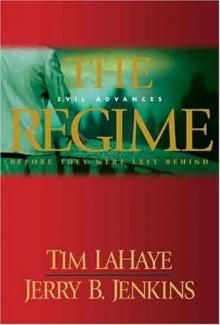 The Regime: Evil Advances
The Regime: Evil Advances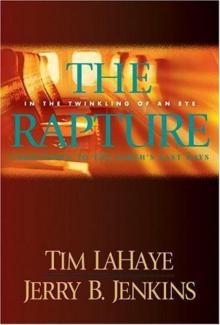 The Rapture: In the Twinkling of an Eye / Countdown to the Earth's Last Days
The Rapture: In the Twinkling of an Eye / Countdown to the Earth's Last Days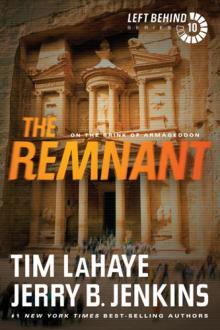 The Remnant: On the Brink of Armageddon
The Remnant: On the Brink of Armageddon John's Story: The Last Eyewitness
John's Story: The Last Eyewitness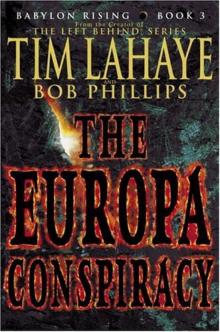 The Europa Conspiracy
The Europa Conspiracy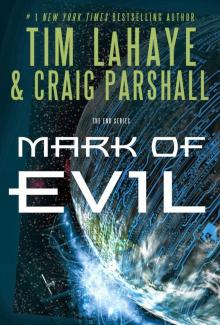 Mark of Evil
Mark of Evil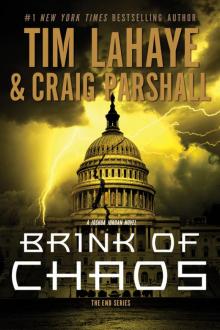 Brink of Chaos
Brink of Chaos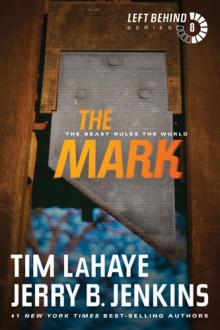 The Mark: The Beast Rules the World
The Mark: The Beast Rules the World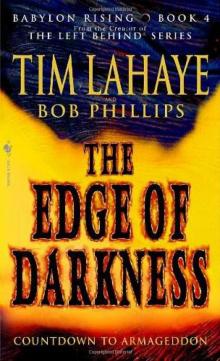 04 The Edge of Darkness
04 The Edge of Darkness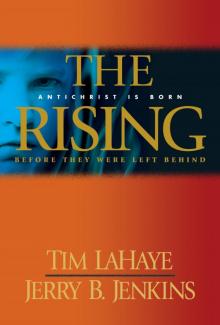 The Rising: Antichrist is Born / Before They Were Left Behind
The Rising: Antichrist is Born / Before They Were Left Behind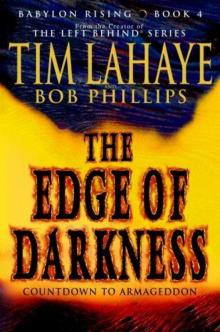 Babylon Rising: The Edge of Darkness
Babylon Rising: The Edge of Darkness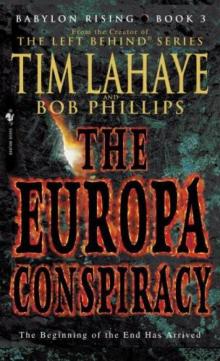 03 The Europa Conspiracy
03 The Europa Conspiracy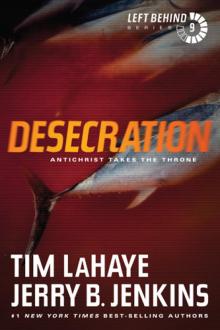 Desecration
Desecration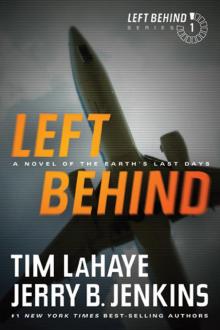 Left Behind
Left Behind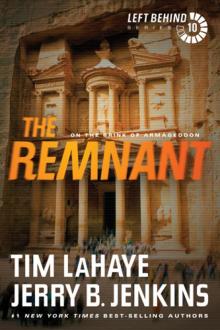 The Remnant
The Remnant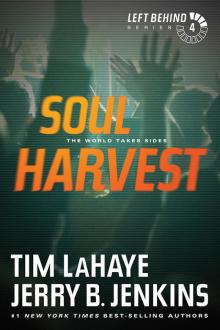 Soul Harvest
Soul Harvest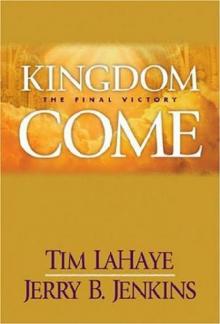 Left Behind Book 13: Kingdom Come The Final Victory
Left Behind Book 13: Kingdom Come The Final Victory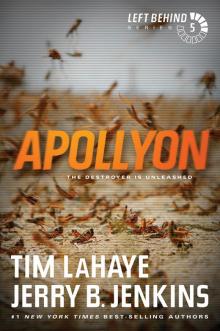 Apollyon
Apollyon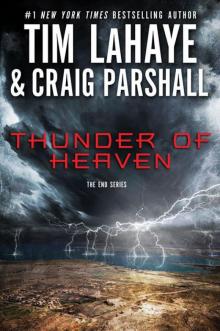 02 Thunder of Heaven: A Joshua Jordan Novel
02 Thunder of Heaven: A Joshua Jordan Novel Glorious Appearing
Glorious Appearing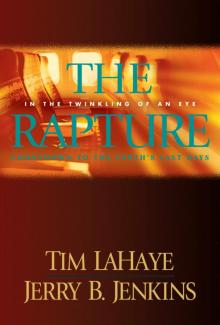 The Rapture: Evil Advances / Before They Were Left Behind
The Rapture: Evil Advances / Before They Were Left Behind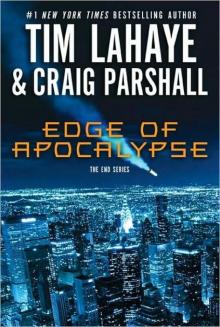 Edge of Apocalypse
Edge of Apocalypse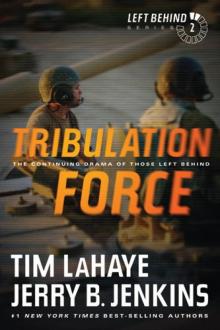 Tribulation Force
Tribulation Force The Left Behind Collection: All 12 Books
The Left Behind Collection: All 12 Books Black Friday
Black Friday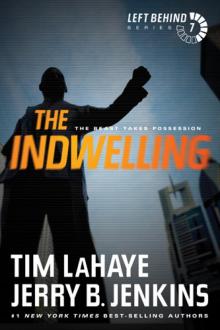 The Indwelling
The Indwelling The Left Behind Collection
The Left Behind Collection